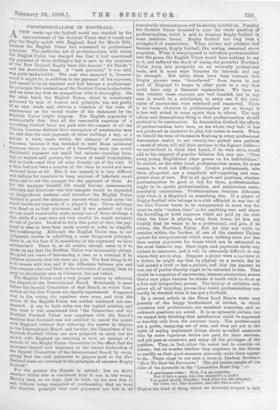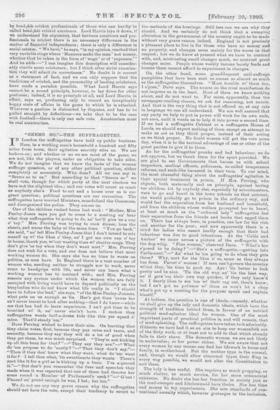PROFESSIONALISM IN FOOTBALL.
FEW weeks ago the football world was startled by the announcement of the Scottish Union that it would not Play the Rugby match with England, fixed for March 20th, because the English Union had consented to professional Practices. The particular act of professionalism with which the English Union was charged was that it had sanctioned the payment of three shillings a day in cash to the members of the New Zealand Rugby team (the famous " All Blacks") and the Australian team. A "cash payment," it was said, was quite inadmissible. The man who accepted it, however small it might be, in addition to the payment of his expenses, had ceased to be an amateur and had become a professional. In principle this contention of the Scottish Union is admirable, and we must say that we sympathise with it thoroughly. On the other hand, the English Union, which is notoriously governed by men of honour and principle, was not guilty of so very crude and obvious a violation of the rules of amateurism as the casual reader of the statement by the Scottish Union might suppose. The English argument is substantially this : that all the reasonable expenses of a travelling football team are paid with the consent of all the Unions, however delicate their conception of amateurism may be, and that the cash payment of three shillings a day, or a guinea a week, came within the category of reasonable expenses, because it was intended to meet those incidental • expenses which no member of• a travelling team can avoid. Incidental expenses are small but various—omnibus fares, tips to waiters and porters, the return of small hospitalities, and so forth—and they all arise directly out of the visit. If a man had not been a member of the team he would not have incurred them at all. But, it was argued, it is very difficult and tedious for members to keep account of infinitely small Bums and to ask the manager for the payment of them. As for the manager himself, life would become unnecessarily intricate and laborious—his best energies would be expended on insignificant matters—and therefore the English Union decided to grant the minimum amount which would cover the small incidental expenses of a player's day. Three shillings was fixed on as that minimum, and it was pointed out that no one could conceivably make money out of three shillings a day, while if a man were not very careful he would certainly be out of pocket. Looked at from this point of view, the pay- ment is seen to have been made merely in order to simplify the bookkeeping. Although the English Union was, in our Judgment, unwise in admitting a most dangerous principle, there is, on the face of it, something in the argument we have summarised. There is, at all events, enough sense in it to make us say that the Scottish Union was inexcusably abrupt. No good can come of denouncing a man as a criminal if he believes sincerely that his views are just. The first thing to do i5 to reason with him, and if the difference between you and him remains vital and likely 'to be subversive of society, then he may be reluctantly sent to Coventry, but not before.
The English Union took a very proper course in referring the dispute to the International Board. Eventually it came before the Special Committee of that Board, on which Com- mittee all the four Unions are equally represented. It appears that in the voting the numbers were even, and thins the Notion of the English Union was neither condoned nor con- demned. A sop to both sides was the logical solution, and this week it was announced that "the Committee and the Scottish Football Union now acquiesce with the Board's decision that Scotland was not entitled to cancel the match with England without first referring the matter in dispute to the International Board, and further, the Committee of the Scottish Football Union are now prepared to carry out the match with England on receiving in turn an excerpt of a minute of the Rugby Union Committee to the effect that the members thereof now acquiesce in the recent declaration of the Special CoMmittee of the International Board, by recog- nising that the cash payments to players paid to the New Zealand team are contrary to the principles of amateur Rugby football."
For the present the dispute is settled ; but we doubt whether either side is convinced that it was in the wrong.
eviug been, as we hope, just to both, we are now free to 'V, without being suspected of partisanship, that we trust the Scottish principle that cash payments are bad in all conceivable circumstances will be strictly insisted on. Possibly the Scottish Union intended to raise the Whole question of professionalism, which is said to threaten Rugby football in some insidious forms. Rugby football has long been a stronghold of amateurism. When cricket and athletics hid become suspect, Rugby football, like rowing, remained above suspicion. When it was proposed to introduce professionalism into the game, the English Union would have nething to say to it, and suffered the shook of seeing the powerful Northern Union jump into prosperity on an avowedly professional basis, and in some ways threaten its interests and sap its strength. But lately there have been rumours that Rugby players were "transferred" from teams in one
part of England to teams in other parts in a way that could have only a financial explanation. We have no . idea whether these rumours are well founded, but in any case it would be a satisfaction to every one if the prin- ciples of amateurism were redefined and reasserted. There is no harm whatever in professionalism per se, though it is less well suited to sonic sports than to others. The only odious and demoralising thing is that professionalism should pretend to be amateurism. In Association football the effects of professionalism have been, on the whole, very bad;" it has not produced an incentive to play, but rather to watch. When we behold the tens of thousands flocking to every professional Association match to see twenty-two picked men perform —most of whom will sell their services to the highest bidder— we are inclined to think that Lamb, if lie were alive, would add to his category of popular fallacies this new one: " That every young Englishman plays games on his half-holidays." In cricket, on the other hand, professionalism seems, for some reason, to work out differently. Cricket professionals, take them altogether, are a singularly self-respecting and com- petent clams of men. But in all sports and pastimes, whether professionalism be good or bad for them, professionalism ought to be openly professionalism, and amateurism unim- peachably amateurism. Professionalism becomes dishonest only when it is disguised as something else. If a player of Rugby football who belongs to a club affiliated to any one of the four Unions wants to be compensated in some way for. what he calls " broken time," or for anything over and abuse the travelling or hotel expenses which are paid by his club when the team is playing away from home, let him say frankly that he wants to be a professional, and join, if he wishes, the Northern Union. But let him not while he
remains within the borders of one of the amateur Unions agitate for compensations which mean nothing more nor less
than money payments for losses which can be estimated in the most fantastic way. Once begin cash payments under any pretext to amateurs, and it will be extremely difficult to say where they are to atop. Suppose a player were a barrister or a doctor, he might say that by playing on a certain day he had missed a brief or lost a patient, and that the amount be was out of pocket thereby ought to be refunded to him. That would be a negation of amateurism, because amateurism means that a man plays because be thinks it worth while to do so as a free and independent person. The history of athletics, and, above all, of bicycling, proves that veiled professionalism can hardly be checked when it has got a foothold.
In a recent article in the Times Lord Harris wrote very genially of the happy brotherhood of cricket, in which amateurs and professionals are excellent comrades, and no awkward questions are asked. It is an agreeable picture, but we cannot help thinking that satisfaction could be expressed. so heartily only from the amateur camp. The professionals are a polite, easygoing set of men, and they are not in the habit of saying unpleasant things about so-called amateurs who by some ingenious device are paid for their services, and yet pass as amateurs and enjoy all the privileges of the position. They, in fact, allow the social test to override all others; but we wonder whether they acquiesce in the theory
so readily as their good manners generally make them appear to do. There rings in our ears a verse in Lindsay Gordon's "How We Beat the Favourite." The old trainer speaks of the rider of the favourite in the "Loa.mshire Hunt Cup " :— " A gentleman rider I Well, I'm an outsider.
But if he's a gent, who the mischief's a Jock P
You gouts mostly blunder; Dick rides for the plunder; He rides, too, like thunder, and sits like a rock."
That is the kind of thing which we shrewdly suspect is said
by bond-fide cricket professionals 'of those who can hardly be called bond-fide cricket amateurs. Lord Harris lays it down, if we understand his argument, that between amateurs and pro- fessionals in cricket there is no necessary difference in the matter of financial independence; there is only a difference in social esteem: " We have," he says, "in my opinion, reached that very enviable stage where ' Manners make the man' not money, whether that be taken in the form of ' wage' or of expenees.' " And he adds:—" I can imagine this description will consider- ably startle some cricketers ; but I think after strict examina- tion they will admit its correctness." No doubt it is correct as. a statement of fact, and we can only suppose that the traditions of cricket, and the personality of leading cricketers, have made a paradox possible. What Lord Harris says cannot be a sound principle, however, to lay down for other pastimes ; indeed, it is no principle at'all, and Lord Harris, in effect, says so, professing only to record an inexplicably happy state of affairs in the game to which' he is attached. Wherever a pastime is distracted by disputes, and has to be pulled straight, by definitions—we take that to be the case with football—there is only one safe rule. Amateurism must be real amateurism.











































 Previous page
Previous page